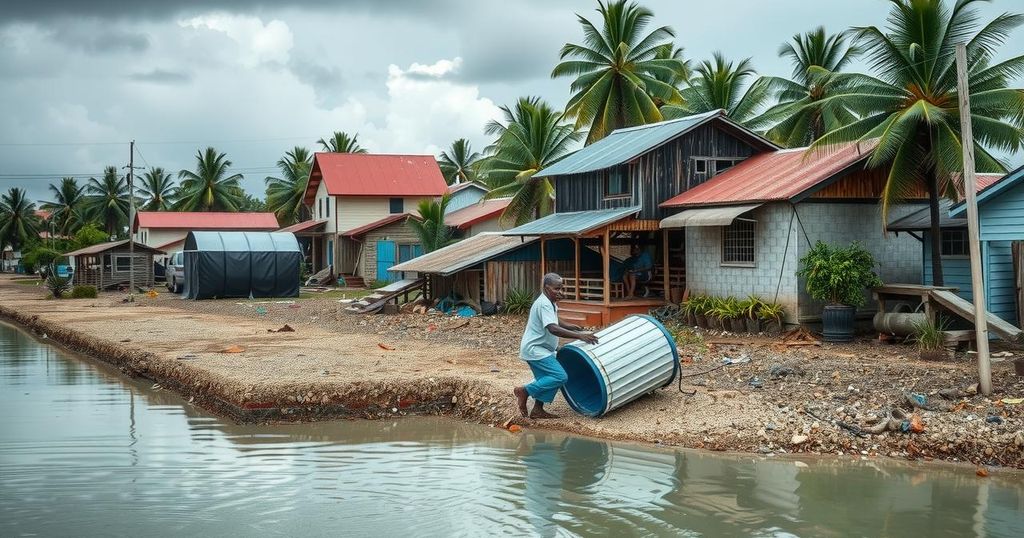World news
AFRICA, CHI, DISASTER RELIEF, DUJARRIC, EMERGENCY RESPONSE, EMMANUEL MACRON, FRENCH INDIAN OCEAN, HUMANITARIAN AID, INTERNATIONAL AID, MALAWI, METEO - FRANCE, MÉTÉO - FRANCE, NATURAL DISASTERS, NEW YORK, NORTH AMERICA, OCEANIA, PACIFIC ISLAND, STEPHANE DUJARRIC, UNITED STATES, VANUATU, WMO, WORLD METEOROLOGICAL ORGANIZATION
Stella Nguyen
0 Comments
UN Mobilizes Humanitarian Aid Following Cyclone and Earthquake Disasters
The UN is addressing humanitarian crises in Mozambique due to Cyclone Chido, which has affected approximately 184,000 people, and caused at least 45 deaths and extensive property damage. Simultaneously, an earthquake in Vanuatu has resulted in nine fatalities and over 200 injuries, prompting a request for international aid. Immediate support efforts are being mobilized in both regions to meet urgent needs for shelter, medical care, and safe drinking water.
The United Nations reported on Wednesday that humanitarian efforts in Mozambique are ongoing following the devastation caused by Tropical Cyclone Chido, which struck over the weekend. The cyclone has severely impacted an estimated 184,000 individuals, resulting in 45 fatalities and around 500 injuries, primarily in the Cabo Delgado province. In addition to the loss of human life, the cyclone resulted in the destruction and severe damage of over 35,000 homes, with nearly 50 health centers and almost 150 schools rendered inoperative.
To coordinate relief efforts, the UN and its partners have focused on assisting the most affected families in the Mecufi district of Cabo Delgado. UN Spokesperson Stéphane Dujarric announced that 2,000 families have already been provided with essential supplies such as food and shelter. “Mobile medical teams are being deployed across the most impacted districts to deliver essential health services,” he stated. Public health measures are also being implemented to prevent disease outbreaks, particularly through the distribution of chlorine and water purification materials. Special attention is being given to unaccompanied minors and children who have lost contact with their families during the disaster.
Cyclone Chido had previously caused catastrophic damage in Mayotte before making landfall in Mozambique, with wind speeds exceeding 200 kilometers per hour and waves measuring over five meters in height. According to the World Meteorological Organization, additional fatalities are feared in Mayotte as the storm has been described as the strongest to impact the region in nearly a century. Following its landfall in Mozambique on December 15, the cyclone diminished in strength but continued to bring heavy rainfall to adjacent areas.
In addition to the crisis in Mozambique, the UN is addressing a grave situation in Vanuatu where an earthquake struck on Tuesday, resulting in nine deaths and injuring over 200 individuals. The authorities have declared a seven-day state of emergency and are actively seeking international assistance. The United Nations, through its Office for the Coordination of Humanitarian Affairs (OCHA), is deploying assessment teams, including the UN Disaster Assessment and Coordination (UNDAC) team, to assist with the local response. Extensive damage has been reported, affecting hospitals, residential structures, and essential infrastructure, which has left many communities isolated. Immediate humanitarian needs have been identified, focusing on medical supplies, restoration of healthcare facilities, and access to potable water.
The recent events resulting from Tropical Cyclone Chido and the earthquake in Vanuatu highlight the vulnerability of regions susceptible to natural disasters. In Mozambique, Cyclone Chido has had a devastating impact on communities, with significant loss of life and damage to infrastructure. Humanitarian agencies are mobilizing assistance to address the immediate needs of affected populations, focusing on health services and disease prevention. In Mayotte, the cyclone’s strength underscored concerns about climate-related impacts on weather patterns and the severity of storms in recent years. The response to these disasters is critical, as it addresses not only immediate relief but also long-term recovery and resilience-building for vulnerable populations. Meanwhile, Vanuatu’s earthquake emphasizes the need for ongoing support and infrastructure resilience in disaster-prone areas, particularly in the context of climate change and geological hazards.
In summary, the United Nations is actively coordinating humanitarian responses to the devastating effects of Tropical Cyclone Chido in Mozambique and the recent earthquake in Vanuatu. Immediate actions being undertaken include the provision of essential supplies, health services, and public health measures to mitigate disease outbreaks. The need for international support is evident as communities in both nations grapple with the significant challenges posed by these natural disasters. Encouragingly, the swift mobilization of resources and expertise reflects the commitment to addressing humanitarian needs and helping affected populations recover and rebuild.
Original Source: www.miragenews.com




Post Comment